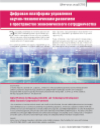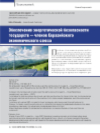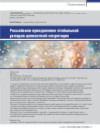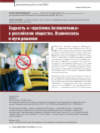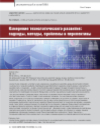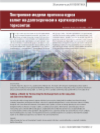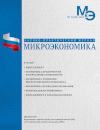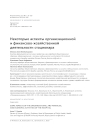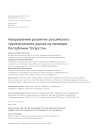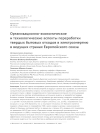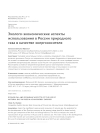Digital Platform for Managing Scientific and Technological Development within Economic Cooperation Framework
DOI: 10.33917/es-1.187.2023.56-69
In the circumstances of sanctions-related economic and scientific-technical blockade, the need to build digital mechanisms for managing import substitution processes on the basis of planning and coordinating competencies, similar to the competencies that the USSR State Committee for Science and Technology had, has sharply actualized. It is proposed to use intelligent digital platforms to control the development of science and technology based on the principles of the Soviet information network OGAS and EGSVC projects. The authors of the article substantiate necessity to apply digital information and communication technologies and computing services at various levels of management for innovative agents of any form of ownership through creating and configurating multilayer information-management fields.
References:
1. Ageev A.I., Loginov E.L. Mirovoe soobshchestvo v usloviyakh sverkhkriticheskoi bifurkatsii [The World Community in the Conditions of Supercritical Bifurcation]. Upravlenie slozhnymi organizatsionnymi i tekhnicheskimi sistemami v usloviyakh sverkhkriticheskikh situatsii: Materialy mezhdunarodnoi nauchno-prakticheskoi konferentsii. Moskva, MNIIPU, 21–22 aprelya 2022 g. [Management of Complex Organizational and Technical Systems in Conditions of Supercritical Situations: Proceedings of the International Scientific and Practical Conference. Moscow, MNIIPU, April 21–22, 2022]. Moscow, INES, 2022, pp. 9–12.
2. Ageev A.I., Loginov E.L. Rossiya v novoi ekonomicheskoi real’nosti [Russia in a New Economic Reality]. Moscow, Institut ekonomicheskikh strategii, Assotsiatsiya “Analitika”, 2016, 460 p.
3. Grabchak E.P. Importozameshchenie v energetike Rossii v usloviyakh sanktsii [Import Substitution in the Russian Energy Sector in the Context of Sanctions]. Upravlenie slozhnymi organizatsionnymi i tekhnicheskimi sistemami v usloviyakh sverkhkriticheskikh situatsii: Materialy mezhdunarodnoi nauchno-prakticheskoi konferentsii. Moskva, MNIIPU, 21–22 aprelya 2022 g. [Management of complex organizational and technical systems in conditions of supercritical situations: Proceedings of the international scientific and practical conference. Moscow, MNIIPU, April 21–22, 2022]. Moscow, MNIIPU, 2022, pp. 16–18.
4. Grabchak E.P., Loginov E.L., Chinaliev V.U., Epishkin I.I. Upravlenie razvitiem slozhnykh nauchno-tekhnicheskikh kompleksov na osnove intellektual’nykh tsifrovykh platform (realizatsiya kompetentsii Goskomiteta SSSR po nauke i tekhnike v usloviyakh tsifrovoi ekonomiki) [Managing the Development of Complex Scientific-technical Systems Based on Intelligent Digital Platforms (Implementation of the Competencies of the USSR State Committee for Science and Technology in Conditions of Digital Economy)]. Moscow, INES, 2023, 504 p.
5. Chinaliev V.U. Razvitie politiki importozameshcheniya v promyshlennosti Rossii [Developing Import Substitution Policy in the Russian industry]. Upravlenie slozhnymi organizatsionnymi i tekhnicheskimi sistemami v usloviyakh sverkhkriticheskikh situatsii: Materialy mezhdunarodnoi nauchno-prakticheskoi konferentsii. Moskva, MNIIPU, 21–22 aprelya 2022 g. [Management of Complex Organizational and Technical Systems in Conditions of Supercritical Situations: Proceedings of the International Scientific and Practical Conference. Moscow, MNIIPU, April 21–22, 2022]. Moscow, MNIIPU, 2022.S. 50–53.



